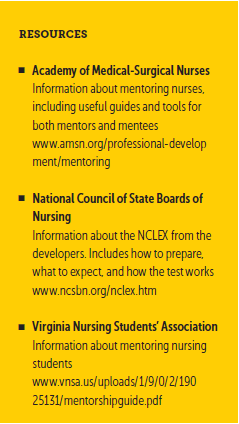As a New Nurse Myself, How Can I Become a Mentor to New Nurse Colleagues?
I recently earned my baccalaureate nursing degree and passed the nursing boards. Soon, I hope to practice as a clinical oncology nurse. As a new RN, I frequently reflect on the people and situations that have influenced my growth so far as a nurse. I have been fortunate to work with many clinical mentors who have been pivotal in this regard. I realize that many small gestures from my mentors have been instrumental in helping me develop my competencies and build my confidence in practice.
Jump to a section
I recently earned my baccalaureate nursing degree and passed the nursing boards. Soon, I hope to practice as a clinical oncology nurse. As a new RN, I frequently reflect on the people and situations that have influenced my growth so far as a nurse. I have been fortunate to work with many clinical mentors who have been pivotal in this regard. I realize that many small gestures from my mentors have been instrumental in helping me develop my competencies and build my confidence in practice.
During nursing school, my senior practicum was in the post-anesthesia care unit. This clinical rotation was full of great learning experiences, but one day stands out in particular. I was closely monitoring two patients when my preceptor walked over and suggested, “How about I take over with our patients and you go check out what’s happening over there.” Interested, I headed over to find a patient who was surrounded by nurses and doctors. This patient was not breathing, and a doctor was providing bag-mask ventilation at the head of his bed. Postoperative respiratory depression is not uncommon, secondary to effects of opioids and/or anesthesia; however, this was the first time I was seeing a patient requiring manual ventilation. Being able to observe this situation first-hand was a special opportunity that was new to me.
As I watched in awe, one nurse asked the doctor at the head of the bed, “Hey, could we let Lizzie step in to bag him for a bit?” The doctor agreed and gestured that I could switch places with him. I was so excited! As a student nurse, I did not have the confidence to ask if I could step in myself, so I was grateful that these clinicians provided me the opportunity to practice this crucial skill. It enabled me to transition from simply observing to feeling like a part of this patient’s care team.
The seconds that it took for me to fumble with the bag-mask device before I began successfully bagging the patient felt like minutes, but the team members were patient and graciously helped me place the mask correctly. Once I began ventilating the patient, time became a blur. One nurse administered naloxone; another administered an anesthesia blocker. The next thing I knew, the patient was breathing again. One doctor then turned to me and said, “And that’s how you save a life.”
This was a profound learning experience for me. I am grateful to the wonderful team members I worked with that day for including me in this unforgettable situation. A series of small, thoughtful gestures from the team allowed me to have an invaluable experience.
Mentors who have supported me have inspired me to find ways that I can support nurse colleagues in their professional growth. For example, I have served as a peer mentor for a student in the cohort graduating after mine, shared knowledge from my CNA training to help peers learn skills (e.g., manual blood pressure measurement, occupied bed changes), and shared resources with students to help them prepare for the NCLEX. I am thankful that I can give back in these ways and look forward to identifying additional ways to help my peers.
I cannot thank my mentors enough for everything they have done for me, and I look forward to learning new ways to support others as I move forward with my nursing career. My desire to help others is what drew me to nursing and attracts me to a career in oncology nursing. Mentoring others, as I have been mentored, is an important part of becoming a professional nurse and a meaningful way to help others. 
About the Author(s)
Elizabeth R. Arnold, BSN, RN, is a recent graduate from the School of Nursing at Johns Hopkins University in Baltimore, MD. The author takes full responsibility for this content and did not receive honoraria or disclose any relevant financial relationships. Arnold can be reached at earnol18@jhu.edu, with copy to CJONEditor@ons.org.

